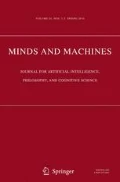Abstract
In this paper we analyze two recent conditional interpretations of defaults, one based on probabilities, and the other, on models. We study what makes them equivalent, explore their limitations and develop suitable extensions. The resulting framework ties together a number of important notions in default reasoning, like high-probabilities and model-preference, default priorities and argument systems, and independence assumptions and minimality considerations.
Similar content being viewed by others
References
Adams, E. (1966), ‘Probability and the Logic of Conditionals’, in J. Hintikka and P. Suppes, eds., Aspects of Inductive Logic, North-Holland Publishing Company, Amsterdam.
Adams, E. (1975), The Logic of Conditionals. D. Reidel, Dordrecht.
Adams, E. (1978), ‘A Note Comparing Probabilistic and Modal Logics of Conditionals’, Theoria 43, pp. 186–194.
Baker, A. and Ginsberg, M. (1989), ‘A Theorem Prover for Prioritized Circumscription’, Proceedings IJCAI-89, pp. 463–467, Detroit, MI.
Delgrande, J. (1987), ‘An Approach to Default Reasoning Based on a First-Order Conditional Logic’, Proceedings AAAI-87, pp. 340–345, Seattle.
Geffner, H. and Pearl, J. (1987), ‘A Framework for Reasoning with Defaults’, Technical Report TR-94-III, Cognitive Systems Laboratory, UCLA, Los Angeles, CA. Also in Knowledge Representation and Defeasible Inference, H. Kyburg, R. Loui, and G Carlson (Eds.), Kluwer, 1990.
Geffner, H. (1989), ‘Default Reasoning: Causal and Conditional Theories’, Ph.D. thesis, Computer Science Department, UCLA, Los Angeles, CA. To be published by MIT Press, December 1991.
Geffner, H. (1990), ‘Conditional Entailment: Closing the Gap between Defaults and Conditionals’, Proceedings of the Third International Workshop on Non-Monotonic Reasoning, pp. 58–72, South Lake Tahoe, CA.
Ginsberg, M. (1990), ‘A Local Formalization of Inheritance: Preliminary Report’, Proceedings of the Third International Workshop on Non-Monotonic Reasoning, pp. 119–130, South Lake Tahoe, CA.
Kraus, S., Lehmann, D., and Magidor, M. (1990), ‘Preferential Models and Cumulative Logics’, Artificial Intelligence 44, pp. 167–207.
Lehmann, D. and Magidor, M. (1988), ‘Rational Logics and Their Models: A Study in Cumulative Logic’, Technical report, Dept of Computer Science, Hebrew University, Jerusalem 91904, Israel.
Lehmann, D. (1989), ‘What Does a Conditional Knowledge Base Entail?’, Proceedings of the First International Conference on Principles of Knowledge Representation and Reasoning, pp. 212–222, Toronto, Ontario. Morgan Kaufmann.
Lewis, D. (1973), Counterfactuals, Harvard University Press, Cambridge, MA.
Loui, R. (1987), ‘Defeat among Arguments: A System of Defeasible Inference’, Computational Intelligence 3, 3, pp. 100–106.
Makinson, D. (1989), ‘General Theory of Cumulative Inference’, in M. Reinfrank et al., eds., Proceedings of the Second International Workshop on Non-Monotonic Reasoning, pp. 1–18, Berlin, Germany. Springer Lecture Notes on Computer Science.
McCarthy, J. (1986), ‘Applications of Circumscription to Formalizing Common-Sense Knowledge’, Artificial Intelligence 28, pp. 89–116.
Nute, D. (1988), ‘Defeasible Reasoning and Decision Support Systems’, Decision Support Systems 4, pp. 97–110.
Pearl, J. (1988), Probabilistic Reasoning in Intelligent Systems, Morgan Kaufmann, Los Altos, CA.
Pearl, J. (1989), ‘Probabilistic Semantics for Nonmonotonic Reasoning: A Survey’, Proceedings of the First Int. Conf. on Principles of Knowledge Representation and Reasoning, pp. 505–516, Toronto, Canada.
Pearl, J. (1990), ‘System Z: A Natural Ordering of Defaults with Tractable Applications to Non-Monotonic Reasoning’, in R. Parikh, ed., Theoretical Aspects of Reasoning about Knowledge, pp. 121–135, San Mateo, CA. Morgan Kaufmann.
Pollock, J. (1987), ‘Defeasible Reasoning’, Cognitive Science 11, pp. 481–518.
Poole, D. (1985), ‘On the Comparison of Theories: Preferring the Most Specific Explanation’, Proceedings of IJCAI-85, pp. 144–147, Los Angeles.
Shoham, Y. (1988), Reasoning about Change: Time and Causation from the Standpoint of Artificial Intelligence, MIT Press, Cambridge, Mass.
Spohn, W. (1988), ‘A General Non-Probabilistic Theory of Inductive Reasoning’, Proceedings 4th Workshop on Uncertainty, pp. 315–322, St. Paul.
Author information
Authors and Affiliations
Additional information
I want to thank D. Nute and J. Pearl for comments on an earlier version of this paper.
Rights and permissions
About this article
Cite this article
Geffner, H. High-probabilities, model-preference and default arguments. Mind Mach 2, 51–70 (1992). https://doi.org/10.1007/BF00261289
Issue Date:
DOI: https://doi.org/10.1007/BF00261289




